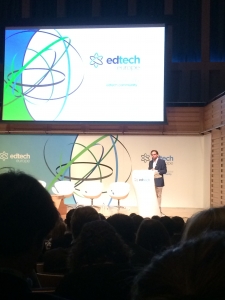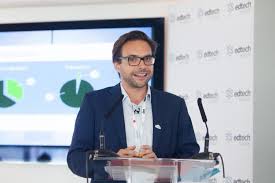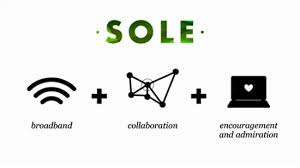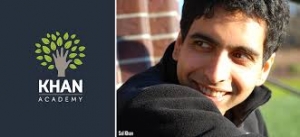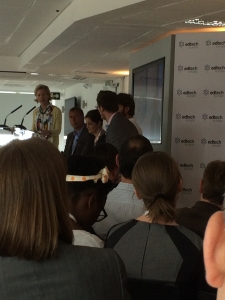This year’s EdTech Europe was held at King’s Place in London near King’s Cross. The event sees investors, entrepreneurs and companies come together to share stories and to discuss the latest innovations, trends and solutions to the big problems facing EdTech.
IBIS Capital explained that education technology is the reset button for global economies. The jobs of the future need people to work with computers and some jobs are more at risk to the digital revolution than others.
The Head of Google Education, Liz Sprout, focussed her talk on what skills business leaders need in the modern workplace. Google conducted an extensive worldwide survey of business CEOs. Problem solving skills came top closely followed by teamwork, communication skills and critical thinking.
Google expeditions is driven by a new phenomenon called Google Cardboard. In essence Google Cardboard is a headset made out of cardboard and lenses with a smartphone attached to enable virtual reality experiences in the classroom. Kids in classrooms can be taken to places they have never been before. The cheap wearable devices can be purchased cost effectively for whole classrooms and change pupils entire outlook on learning through immersive virtual reality. Kids can go to up to 50 different world locations and teachers and can teach lessons in ways they have never done before.
Another talk involved Rob Grimshaw of TES Global, Karine Allouche Salanon CEO of Pearson English Business Solutions and John Martin CEO of Sanoma learning focused on the teacher being at the centre if the education system. According to the panel, it’s the teacher that is the killer app. Finland’s PISA scores are significantly higher than that of the UK and France and thus there living standards and earning potentials are higher. Apparently a 25 points difference in PISA score represents $100,000 of lost earnings over a workers life time.
2U’s founder Rob Cohen talked about their services to take top universities in the USA online. They explained how student enrolment and attraction tended to have a local bias. Prospective students living further away from a campus were less likely to enrol, even if the course was online. 2U are offering online degrees for universities at the same cost and with same certificate. Whilst the university is in control of enrolment and certification, 2U provides the content, recruitment service and enables the traditional universities journey to widen their reach online.
A further panel involved Maurice de Hond, the founder of the Steve Jobs School based in The Netherlands, A French School Lycee International de Londres and Anne Preston, a Researcher from SOLE Central at Newcastle University. Maurice de Hond explained that simply adding new technology to old schools is an expensive exercise. What is actually needed is a new learning experience and classroom environment. Sugata Mitra is resident at Newcastle University and has been spending many years on his School in the Cloud project which is all about SOLE (Self Organised Learning Environments). In SOLEs, the role of the teacher changes from the transmitter of information to more of a coach and a researcher of data analytics. This new model allows for self paced, personalisation of learning and adaptive learning which is tailor made to the needs of the learners. There is no lesson plan and the learning is unstructured i.e. self organised. This way if one pupil is struggling they are given more time to catch up with the rest of the class. This is what some people believe will be the smart classroom of the future.
OneBillion is a project help provided learning and teaching solution to children in Malawi. In Malawi there are usually 9,000 pupils in a school with classroom sizes of 250 pupils per class. OneBillion use solar powered iPads to increase the learning opportunities for these children, and the curriculum is delivered in the local language. A similar project running in Kenya by Avanti Communications Group beams broadband into schools using satellites. Often the developing world is moving quicker towards a mobile first, cloud first approach to teaching and learning, given the lack of fixed line internet and the availability of 3G and 4G. These stories are touching ways that education technology can make a real impact on the life chances of people in poorer nations. Certainly, the much shorter school days on the African continent can be extended by the use of digital technology. EdTech can be an education leveller, and can reach students less fortunate than ourselves.
Indeed Sal Khan of Kahn Academy was then beamed into the lecture auditorium to talk about his massively successful not-for-profit education platform. Khan Academy first came under the spotlight when Bill Gates mentioned the project in a TED talk a few years back. The platform allows millions of students globally, in different languages, to study self paced Maths, Physics, Biology and Chemistry. The idea started when Sal was teaching his cousins Maths over the internet by posting Maths videos to YouTube. The most touching story was to see a Princeton STEM graduate come top of his class using Khan Academy. The student went on to state that he would not have made it to University if it was not for the Khan Academy and that the platform had changed his life. He had been failing time and time again in the traditional classroom and it was only the introduction of Khan Academy that saved him on his learning journey. Khan Academy is now in the process of broadening its reach, both in terms of subjects and in terms of languages.
Perhaps the biggest opportunity is life long learning; mapping the skills needed for graduates and the workforce at large to learn the skills needed for their ideal job and then to stay in that job. Understanding what the consumer (i.e. the learner) wants and then mapping out a learning path for these individuals would provide the personalisation of learning needed for career success.
Education spending continues to rise without a proportionate improvement in standards and learning outcomes. Education technology has the power to change this as long as the software, content and devices are easy for teachers to use. Shifts are happening in learning. Technology does not equal engagement. Information is all around us, Google can tell you the answer to anything. What is more important is how you understand the information and how you apply it.
Questions are more important than answers. We don’t know what the future will be so how can we teach for this? We know that graduates today will have 27 different jobs in their lifetime. The boundaries between working and learning are merging. Industry aligned curriculum is needed at the pace that the tech industry moves. Everyone is a tech company; Goldman Sachs now has more developers than Facebook. Industries are going digital. This means we can reach more people and we can engage them in different ways. Learning technology has to have great user experience; it must work on mobile phones and fit around people’s lives. Once this happens we will have passionate, excited audiences, who from their personal dashboards and feedback will be able to change the world.
Following EdTech Europe we will be hosting an EdTech Conference in Leeds more details are here:
